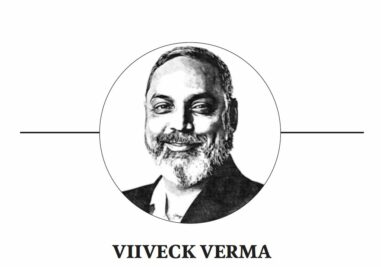
By Viiveck Verma
Guidance is a much sought-after phenomenon in today’s world. Everything seems massively prone to change and consequently, relentlessly confusing, and in such times, wisdom is as precious as it gets. However, to be guided properly, what do we need? Do we need to be mentored, do we require coaching or both? I suggest a powerful amalgamation of the two as an effective solution to the need for guidance today.
To mentor and to coach are the prerequisites for training for any domain in life, and can strongly come together in what I term the ‘Mentroach’ approach. It is a novel viewpoint that I came up with when I assumed my role as a guide to several individuals and entities, and found existing approaches to providing direction ineffective. Consequently, I have been a proponent of this many-sided process and propagated this way of guiding people over several years. Let us look at this in some detail, for this deceptively simple premise has many shades of meaning. Mentoring & Coaching
To understand ‘Mentroach’, we need to understand the differences between mentoring and coaching, phenomena which are often confused with each other.
While mentoring typically entails a seasoned person sharing insights and knowledge gained through experience to guide a relatively less experienced person, coaching, on the other hand, is primarily goal-oriented and focused on specific skills or tasks. Mentoring is profound, for it centres on personal as well as professional development, offering advice, acting as a role model and imparting broad life lessons. Coaching, on the other hand, supports the coachees by enhancing their performance, enabling them to overcome obstacles, and develop skills through consistent and structured sessions which are tailored to their needs and ultimately help them in achieving their objectives. Mentoring relationships often develop organically, can be long-term and are characterised by a deeper personal connection where the mentor shares experiences and values in a trust-based equation. Coaches, however, tend to maintain a more objective stance, employing active listening, dynamic questioning and accountability to help the coachee to explore possibilities, generate solutions to problems and take action. Mentors work through transferring knowledge and wisdom to aid the mentee’s progress, whereas coaches focus on empowering the coachees to find their own solutions.
The ‘Mentroach’ approach is premised on the assumption that combining mentoring and coaching can be highly efficacious as it blends the personal guidance and expertise offered by a mentor with the structured approach and goal-oriented nature of coaching. This is a paradigm shift in the sense that it covers all bases with regard to an individual’s development, the emotional and the professional components all included. This not just saves time and unnecessary interaction but also creates deeper and stronger bonds of learning that work in the long run. The benefits to be incurred through this approach are manifold.
Many Benefits
First of all, ‘Mentroach’ is all about holistic development. While mentoring brings wisdom and experience to the table, providing insights and advice based on personal experience, coaching focuses on the twin goals of skill development and goal accomplishment. By combining the two, individuals end up receiving holistic support in the trajectories of both personal and professional growth. For example, if you intend to be a lecturer, a mentor might share observations on career progression while a coach assists in developing specific skills needed for advancement. Another combination can be guidance from a senior professor who can don both hats, assess and sharpen your academic competence and give you advice on dealing with the scenarios in academia.
Secondly, it is important to note that coaching emphasises setting goals and creating action plans to achieve them. A mentor can crucially support this process by offering guidance and perspectives based on their own journey. For instance, a coach might help set specific career milestones such as the pay and the position, while a mentor can share valuable experiences that illustrate how these goals align with broader professional paths.
Thirdly, coaching tends to follow a structured process, while mentoring is more flexible and adaptive. When combined, individuals strongly benefit from the tailored approach of coaching while also significantly gaining from the adaptable nature of mentoring. This combination allows the learners to embrace both structure and the ability to pivot based on individual requirements. Finally, relationships of mentoring often evolve over periods of time and can provide ongoing support, while coaching usually has a more defined timeline. By combining the two and letting go of neither, individuals can receive continuous guidance on particular goals while also having a long-term relationship that offers broad support and counsel.
New Guide
However, the shift to ‘Mentroach’ is not simply about asking individuals to receive both mentoring and coaching, but also a push in the direction of asking for a new kind of guide. This new guide, the ‘Mentroach’ can be a one-stop problem solver for people, creating a tectonic shift in the worlds of leadership and guidance. A guide who can seamlessly switch between mentoring and coaching roles can adapt to different situations and needs.
Being both a mentor and a coach allows a facilitator to offer flexible and supportive relationship that caters to the multifaceted needs of individuals they’re helping
Sometimes individuals require particular skill development, as in, coaching, while in other instances, they might seek broader advice and wisdom, or mentoring. Being able to navigate between these roles ensures that the guide can ideally meet the diverse and multiple needs of those they’re guiding. Therefore, in essence, being both a mentor and a coach allows a facilitator to offer a comprehensive, flexible and supportive relationship that caters and responds to the multifaceted needs of the individuals they’re helping, fostering the synergy of personal and professional growth effectively.
On the whole, the ‘Mentroach’ approach is all about the holistic and complete empowerment of individuals. After many years of being a ‘Mentroach’, I can assert that it encourages individuals to take ownership of their journeys of growth while leveraging the expertise of both mentors and coaches, or the mentor-coaches. The integration of mentoring and coaching proactively widens the scope and perspective of guidance and fosters a culture of continuous learning. It encourages and supports ongoing dialogue, continuous exchange of knowledge and enhancement of skills. It is time to turn to the next chapter in the realm of leadership and guidance, it is the time to adopt the ‘Mentroach’ way of doing things.

Viiveck Verma
(The author is Founder & CEO, Upsurge Global, Advisor & Adjunct Professor, EThames College, and Strategic Advisor and Venture Partner, SilverNeedle Ventures)

 1 week ago
1 week ago
















 English (US) ·
English (US) ·